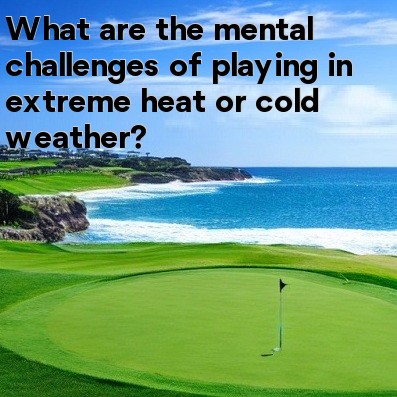
The Mental Challenges of Playing Golf in Extreme Heat or Cold Weather
Golf is a challenging game, and players often face various obstacles that can affect their performance. One such challenge is playing in extreme weather conditions, such as heat or cold. These conditions not only impact the physical aspects of the game but also pose mental challenges that players must overcome. In this article, we will explore the mental challenges golfers face when playing in extreme heat or cold weather.
Extreme Heat
When playing golf in extreme heat, golfers encounter several mental hurdles that can affect their performance. Firstly, excessive heat can lead to fatigue and dehydration, which in turn affects their ability to concentrate and make smart decisions on the course. The heat can also cause discomfort and irritability, making it difficult for players to stay focused and maintain a positive mindset throughout the round.
Additionally, extreme heat can impact players' confidence levels. This is especially true if they are not accustomed to playing in such conditions. The fear of succumbing to heat-related illnesses or underperforming due to the weather can lead to self-doubt and a lack of confidence in one's abilities.
Moreover, when playing in hot weather, golfers may find it challenging to keep their emotions in check. Heat can heighten frustration and anger, resulting in poor decision-making and a negative attitude on the course. Controlling these emotions becomes crucial to maintaining focus and composure during challenging rounds in extreme heat.
Extreme Cold
Similar to extreme heat, playing golf in extreme cold weather poses mental challenges for golfers. Cold weather can lead to discomfort and physical limitations, affecting a player's mental state. The difficulty of swinging clubs with multiple layers of clothing and the numbness in their hands can impact their confidence and ability to execute shots effectively.
Furthermore, the cold weather can lead to decreased motivation and persistence, as it becomes challenging to enjoy the game in such conditions. Gripping the club becomes difficult, and the decreased distance and control can frustrate players, leading to negative thoughts and self-criticism.
Playing golf in extreme cold weather also requires golfers to adapt their strategies and shot choices. The cold can affect ball travel and green conditions, forcing players to make tactical adjustments. This need to constantly adapt can be mentally draining and add an extra layer of challenge to an already demanding game.
Overcoming the Mental Challenges
Despite the mental challenges posed by extreme heat or cold weather, golfers have strategies to overcome these obstacles:
- Stay hydrated and take breaks: Maintaining physical well-being helps in staying mentally focused.
- Practice in similar conditions: Familiarity breeds confidence, so practicing in extreme weather can help prepare mentally.
- Positive self-talk: Remind yourself of your skills, and stay positive even when facing difficulties.
- Adapt your game plan: Embrace the challenges and develop strategies that suit the weather conditions.
- Focus on the present: Concentrate on the shot at hand, rather than worrying about the weather or previous mistakes.
- Maintain a relaxed mindset: Take deep breaths, visualize successful shots, and try to enjoy the game regardless of the conditions.
In conclusion, playing golf in extreme heat or cold weather presents unique mental challenges for golfers. However, with the right mindset, preparation, and strategies, players can overcome these obstacles and improve their performance on the course.




